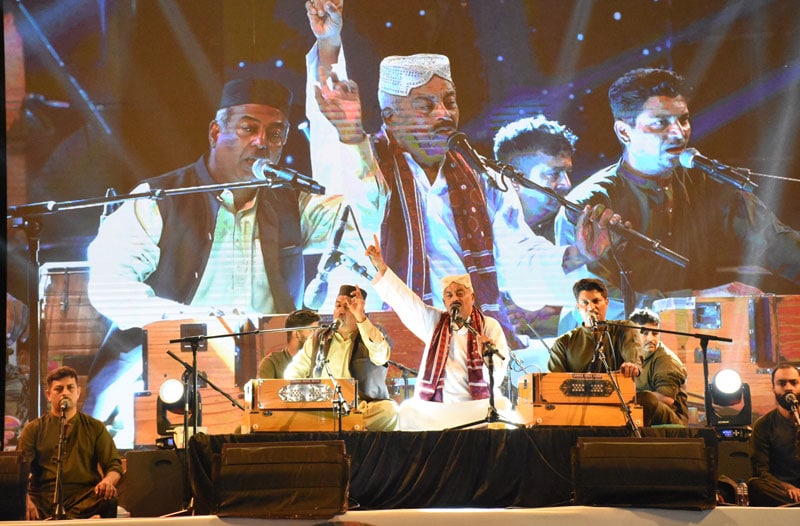World Culture Festival 2024 continued to dazzle as it celebrated its 11th day with a stunning Qawwali performance by the renowned maestros Fareed Ayaz and Abu Muhammad. Organized by the Arts Council of Pakistan, Karachi, the event drew a large crowd to the Jaun Elia Lawn, where music lovers gathered to witness a night of soulful and traditional sounds.
The evening began with an address by Muhammad Ahmed Shah, President of the Arts Council of Pakistan, Karachi.
He expressed his commitment to showcasing the country’s rich cultural diversity. “We have ensured that this festival represents all of Pakistan. Folk music is our own music, and we are here to honor our legends. We want to keep our traditions alive,” said Shah. He further addressed common misconceptions about the city, noting, “Google may label Karachi as a dangerous city, but we are a more peaceful nation than Chicago, London, and Paris. We love our country, and people are even coming from Palestine to attend our festival.”
Shah also touched on the broader issue of cultural unity in Pakistan. “There is a lack of cultural ties between our provinces,” he said, underscoring the importance of fostering unity through shared traditions and art. His words resonated strongly with the audience as he called on the younger generation to take ownership of their heritage and identity:
“The youth are my last hope. Own your country, and own your city.” As the evening progressed, the Qawwali duo of Fareed Ayaz and Abu Muhammad took center stage, captivating the audience with their soulful performance. Known for their deep understanding of classical and Sufi music, the duo effortlessly blended tradition with emotional intensity, creating an atmosphere that held the crowd spellbound. Their powerful renditions, filled with energy and passion, had the audience swaying to the rhythms of the Qawwali. The open-air venue provided the perfect backdrop as the night sky echoed with the melodies of devotional music, creating a deeply spiritual experience for attendees. As the beats of the tabla and harmonium intertwined with the rich vocals, the audience erupted into cheers, fully immersed in the magic of the performance. The 11th day of the festival highlighted not only the timeless appeal of Qawwali but also the role such cultural events play in bridging divides and nurturing unity. The World Culture Festival has been instrumental in bringing together people from various walks of life, promoting a shared appreciation of Pakistan’s rich heritage. This year, the festival has garnered attention from both local and international attendees, with participants even traveling from places as far as Palestine to experience the celebrations. The event also emphasized the Arts Council’s ongoing efforts to support and promote traditional art forms in a rapidly modernizing world. By hosting performances like these, the festival shines a light on the importance of preserving cultural traditions and passing them on to future generations. As the festival moves forward, the success of Qawwali Night stands out as a reminder of the unifying power of music. It demonstrated that, despite the challenges of modern life, the art of Qawwali continues to resonate deeply with audiences, transcending age, background, and region. With several more days of performances, exhibitions, and cultural events planned, the World Culture Festival 2024 promises to continue celebrating Pakistan’s vibrant artistic landscape, reinforcing the Arts Council’s vision of preserving and promoting the country’s rich cultural heritage.










